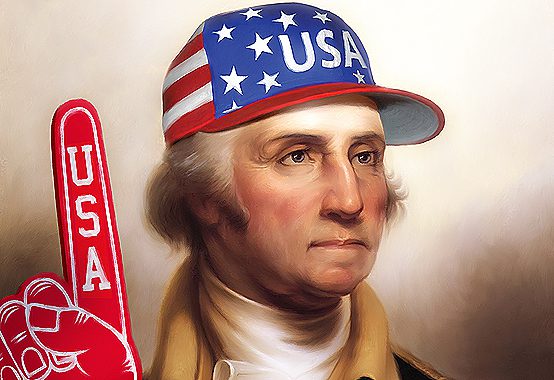Americans Aren’t “Hard-Wired” for American Exceptionalism
By • October 20, 2014,

Illustration by Michael Hogue
Roger Cohen shows why invoking American exceptionalism is frequently a crutch for extremely weak arguments. Here he attempts to use it to account for differences between China and America:
The core problem is two forms of exceptionalism, the American and the Chinese. The United States is an idea as well as a nation. Americans, even in a battle-scarred inward-looking moment such as the present, are hard-wired to the notion of their country as a beacon to humanity. President Obama’s foreign policy is unpopular in part because he has interpreted a popular desire to regroup as license to be satisfied with hitting singles and avoiding strike-outs. That is the attitude of an unexceptional nation, which can never be America’s self-image.
We should be wary of anyone that attempts to explain the behavior of states with claims about what entire nations are “hard-wired” to do or believe, and that goes double for pundits. We should be even more skeptical when the “hard-wired” belief that a nation is supposed to hold just happens to be the one that the pundit also shares. It usually turns out that the “hard-wired” behavior that the pundit has “discovered” is the product of relying on gross generalizations about whole nations that happen to fit the point that the pundit wanted to make.
Like other people everywhere, Americans like to be flattered, and many of the conceits expressed in American exceptionalist rhetoric are undoubtedly very flattering. However, that doesn’t mean that most Americans believe all the outlandish claims of the specifically hegemonist version of American exceptionalism that Cohen is describing. Most Americans might generally approve of the idea that America should be a “beacon” in the world, but even then that doesn’t tell us very much. Does that imply an activist, intrusive foreign policy of the kind that Cohen has so often endorsed in recent years, or does it imply something completely different? After all, there was once a very different sort of American exceptionalism according to which Americans aspired to be a non-interfering, neutral power. It explicitly rejected the kind of meddling and “missionary” foreign policy that Cohen assumes is impossible for Americans to do without. In any case, there are no “hard-wired” political notions, and such beliefs can and do change depending on experience and circumstances. The more that Americans see “American exceptionalism” as nothing more than an excuse used by politicians and pundits to justify yet another conflict or international rivalry, the more likely it is that most of them will eventually get tired of the phrase and what it implies.
https://www.theamericanconservative.com/larison/americans-arent-hard-wired-for-american-exceptionalism/

0 Comments:
Post a Comment
Subscribe to Post Comments [Atom]
<< Home